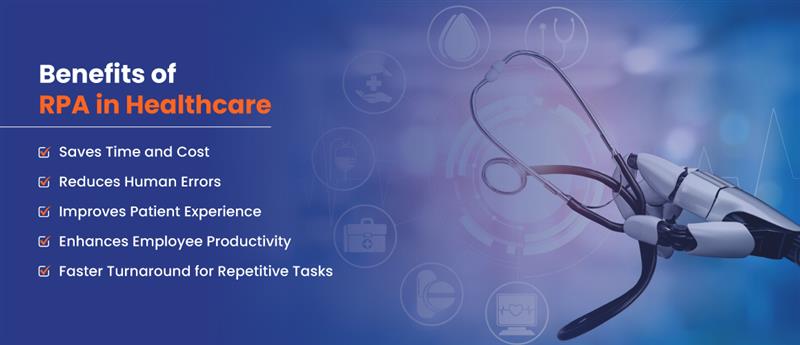Process automation drives digital transformation, making it a necessity for modern industry sectors. The healthcare sector faces tremendous pressure due to patients’ changing expectations and other challenges, including regulatory complexities. In such a complex scenario, RPA solutions lend a helping hand to the medical staff to offer high-quality patient care.
RPA (Robotic Process Automation) can automate repetitive and rule-based tasks like patient registration, claims processing, and appointment scheduling. It can eliminate inaccuracies in billing and medical inventory. Let’s dig deep into the role and benefits of RPA in healthcare sector. We will also go through popular use cases of RPA in this industry.
Why Healthcare Needs RPA
These days, hospitals and clinics witness a steady rise in the number of patients. On the other hand, globally, the sector faces an ongoing shortage of qualified medical staff. This situation puts immense pressure on existing medical resources and results in extended patient wait times, with issues in patient care.
Moreover, constant compliance pressure weighs high on administrative and clinical teams. In this complicated environment, it is difficult for the healthcare industry to manage manual processes while avoiding inefficiencies and human errors. Here, RPA services assist healthcare organizations in implementing solutions easily and without a complete overhaul of the existing infrastructure.
RPA can increase the efficiency and accuracy of rule-based tasks in the healthcare industry to enhance patient care.
Here we mention some use cases of RPA in healthcare industry.
Top Use Cases of RPA in Healthcare
Robotic Process Automation offers robust solutions for addressing major operational shortcomings of the healthcare industry. Here are some use cases of RPA solutions that transform the healthcare sector.
Patient Data Entry & EHR Integration
The healthcare sector deals with vast amounts of patient data, ranging from medical history to lab results and diagnoses to medication. Manual data entry of such information can lead to errors, delays, and inconsistencies.
RPA bots can automate the extraction of information from various sources and store it accurately into EHR (Electronic Health Record) systems.
Medical Billing & Claims Processing
These are highly time-consuming and complex processes in the healthcare industry. These processes are prone to human errors, and therefore, RPA services enable healthcare organizations to automate numerous steps.
Whether it is verification of patient insurance eligibility or generating and submitting claims, RPA bots can complete these processes in real time.
Appointment Scheduling & Reminders
Missed appointments are cumbersome for patients and healthcare facilities alike. RPA solutions can streamline the appointment management process.
They can handle requests via any channel, check the physician’s availability, and send automated reminders to patients. This can assist front-desk staff to focus more on complex patient interactions rather than calling or texting them.
Regulatory Compliance & Audit Preparation
The healthcare industry has to follow stringent regulations like HIPAA. When it comes to following compliance and audit-related requirements, RPA bots remain handy.
They can automate the collection, validation, and reporting of data necessary for audits. Moreover, RPA bots can also ensure that all data encryption protocols are properly followed.
Inventory & Supply Chain Management
This is one of the most important and popular use cases of RPA in healthcare. Bots can track inventory levels and generate purchase orders when medical stock runs low. This helps manage medical supplies and pharmaceuticals effectively.
A real-world scenario is an RPA bot that monitors the stock of critical medicines in a pharmacy and initiates a reorder when necessary.
Apart from these use cases, the AI and RPA combination can work wonders in the thriving healthcare industry. AI brings intelligence automation to the healthcare sector in various administrative and clinical processes, including document processing for lab reports.
It is interesting to jot down the benefits of RPA in healthcare.
Benefits of RPA in Healthcare

Robotic Process Automation services can be a game-changer for the healthcare sector. Some of the noteworthy benefits of RPA in healthcare include
Saves Time and Cost
It reduces the time spent on manual and repetitive tasks by automating processes. Healthcare organizations can handle the flow of patients easily with fewer resources. This efficiency translates into saving costs, time, and effort. It further optimizes operational expenditures over the period.
Reduces Human Errors
Manual data processing is prone to errors, and the healthcare sector simply cannot afford it due to serious consequences. For example, incorrect patient billing can cause a financial loss, and misdiagnosis can lead to the loss of life. Therefore, the healthcare sector needs 100% accuracy, and RPA ensures it.
Improves Patient Experience
RPA can automate administrative or clerical tasks to enable healthcare service providers to reduce patient wait times and accelerate the registration process. It results in a smoother, more efficient, and pleasant patient journey to enhance their overall experience.
Enhances Employee Productivity
RPA solutions can save the time and effort of healthcare staff by handling mundane and repetitive tasks. It facilitates them to focus on higher-value activities for improving patient experience and increasing productivity. The healthcare staff can feel more efficient and get job satisfaction.
Faster Turnaround for Repetitive Tasks
RPA bots can operate 24/7 without taking any breaks. It accelerates the completion of high-volume, rule-based, and repetitive activities every day. As a result, processing times for repetitive tasks ranging from patient admission to appointment scheduling decrease significantly.
Apart from these benefits, RPA services assist healthcare organizations in getting real-time data insights and scale their operations as and when necessary. RPA bots can improve revenue cycle management and drive the growth of a hospital through transformation. However, it is essential to meet some challenges and follow considerations to leverage these benefits of RPA.
Challenges & Considerations for RPA Implementation
The implementation process of RPA is challenging, and RPA solution providers need to keep several aspects in mind during this process. Here are several challenges and considerations organizations should focus on when implementing RPA in healthcare.
Data Security (HIPAA compliance)
Patient health information (PHI) is the most sensitive data that needs robust security. Stringent compliance regulations like HIPAA (Health Insurance Portability and Accountability Act) should be considered when deploying RPA solutions. It is a primary challenge to ensure that RPA bots, which interact with PHI, maintain the highest standards of integrity, availability, and confidentiality.
Integration with Legacy Systems
Legacy or outdated systems can cause a significant hurdle in RPA implementation. Many hospitals have outdated EHR systems and billing platforms that lack modern APIs for seamless integration. Though RPA is known for its ability to interact with various systems at the UI level, the lack of APIs can cause a challenge. Moreover, these integrations may not be robust enough.
Change Management and Staff Buy-in
RPA implementation is a significant organizational change that impacts human resources directly. It is, therefore, necessary to implement change management in the organization and involve medical staff in the process. Clear communication and comprehensive training can make change management more effective with staff buy-in.
A reputed RPA solutions provider can help your hospital or clinic get the advantage of automation and transformation by addressing these challenges.
What’s Next in Healthcare RPA?
The future of RPA is rapidly evolving to go from simple task automation to intelligent automation in healthcare sector.
Rise of AI-powered RPA bots
It can bring intelligent automation (IA) to handle more complex and unstructured data. For example, AI in healthcare automation is capable of analyzing physicians’ notes and lab reports to extract critical information.
Integration of RPA Bots with Wearables
This can play a pivotal role in streamlining telehealth by automating appointment scheduling and sending reminders. RPA services can integrate bots with wearables like smartwatches and other remote patient monitoring devices to ensure continuous patient monitoring.
Predictive Automation for Better Care
AI and RPA will combine to build the most transformative application that brings. AI algorithms can predict disease progression or even the likelihood of a patient missing an appointment. Apart from getting real-time data through RPA, physicians can predict the patient’s health outcomes with the help of AI.
We can expect that as technologies evolve, the healthcare sector will benefit more from intelligent automation.
Concluding Remarks
RPA plays a vital role in handling repetitive tasks like appointment booking and medical inventory management. It can save a lot of time and the cost of healthcare organizations while reducing human errors through automation. However, it is imperative to address some implementation challenges and follow considerations to leverage all the benefits of RPA in healthcare industry.
Silver Touch Technologies Inc. is a leading RPA solutions provider. Our in-house team of experienced RPA professionals can thoroughly research before suggesting the most suitable RPA solution for your company. We assist you at every stage of RPA implementation so that you can leverage the benefits of this revolutionary technology. Schedule a demo to learn how RPA brings transformation in patient care and other services.



